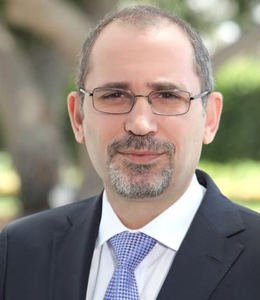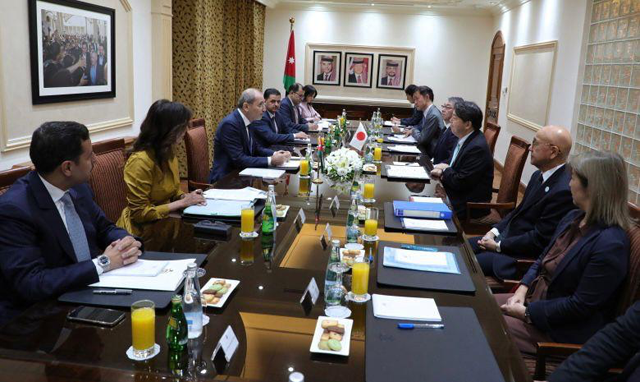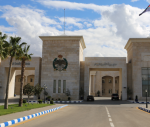You are here
Safadi, Japan’s Hayashi hold 3rd round of strategic dialogue meetings
By JT - Mar 13,2023 - Last updated at Mar 13,2023

Deputy Prime Minister and Foreign Minister Ayman Safadi and his Japanese counterpart Yoshimasa Hayashi during the third round of the Jordanian-Japanese strategic dialogue meetings in Tokyo on Monday (Photo courtesy of Japan Ministry of Foreign Affairs)
AMMAN — Deputy Prime Minister and Foreign Minister Ayman Safadi and his Japanese counterpart Yoshimasa Hayashi on Monday held the third round of the Jordanian-Japanese strategic dialogue meetings in Tokyo.
During a meeting, also attended by Minister of Planning and International Cooperation Zeina Toukan, the two officials discussed ways to enhance bilateral cooperation and increase coordination on regional and international issues of mutual interest, according to a Foreign Ministry statement.
Safadi, who is visiting Japan to hold talks with Japanese officials ahead of His Majesty King Abdullah's upcoming visit scheduled for next month, emphasised the importance of the third round of dialogue in strengthening relations between the two countries.
Both sides affirmed their countries’ commitment to expanding cooperation in various fields and highlighted the increasing ties between Jordan and Japan within the framework of the strategic partnership.
The two ministers agreed to deepen bilateral cooperation in various areas, including politics, the economy, security and culture.
They also stressed the importance of maintaining the positive momentum in the bilateral relationship by continuing to hold strategic dialogues and high-level visits.
Hayashi emphasised that Japan values the role of Jordan as a key partner in the region, stressing that his country will continue to provide economic and development support, especially in the water and energy sectors.
Highlighting the projects implemented by the Japan International Cooperation Agency (JICA) in Jordan, the official noted that Japanese support to the Kingdom between 2009 and 2022 totals $1.8 billion.
Safadi praised Japan's continuous support to Jordan to help the Kingdom achieve economic development and confront the repercussions of regional crises.
Toukan, during the meeting, reviewed the economic cooperation programmes between Jordan and Japan, and explained the measures taken by the Kingdom to develop the investment environment and stimulate economic growth.
Toukan stressed the importance of the soft loan of $110 million provided by Japan to Jordan in December last year to support the reform programme in the electricity sector. The soft loan came as part of Japan's commitment made at the 2019 London Conference to provide soft loans of $300 million from 2021-2023.
Hayashi praised Jordan's key role as a refugee host country, especially of Syrian refugees, confirming that Japan will continue to support refugees. The Japanese minister noted that his country provided about $10.44 million in support of refugees last year through international organisations such as the United Nations Relief and Works Agency for Palestine Refugees (UNRWA) and the United Nations High Commissioner for Refugees (UNHCR).
Safadi emphasised the importance of Japan's support for refugees, and noted that providing decent living conditions for refugees is an international responsibility, and not solely the responsibility of refugee-hosting countries, warning against the decline in support.
Talks also referred to the two countries' efforts to organise the 2022 Global Refugee Forum, which will highlight the need for sustainable support for refugees and host countries.
The two ministers welcomed the continuation of enhancing defence and security cooperation between the two countries, and agreed to deepen partnership in the fields of cybersecurity and counter-terrorism through the Aqaba meetings.
The ministers also welcomed greater bilateral cooperation in academia through cultural exchange programmes between Jordanian and Japanese universities.
Safadi and his Japanese counterpart also discussed several regional and international issues of mutual interest, foremost of which were the Palestinian cause and efforts to resolve the Syrian crisis.
Safadi acquainted his Japanese counterpart with the Kingdom's efforts to halt the deterioration of the situation of the occupied Palestinian territories and to find a political horizon for resuming serious negotiations to achieve a just and comprehensive peace based on the two-state solution.
Safadi stressed the importance of stopping Israel's illegitimate measures that fuel violence and undermine the peace process.
Hayashi praised Jordan's deescalation measures and efforts to reach a political solution, citing the recent meeting in Aqaba as an “important step in that direction”.
He also emphasised the importance of the role of the Hashemite Custodianship over Jerusalem's Islamic and Christian religious sites, stressing his country's support for peace efforts. Safadi, in turn, expressed his appreciation for Japan's efforts to support the two-state solution.
The ministers also discussed the Syrian crisis, with Safadi presenting his Japanese counterpart with the Jordanian initiative to find a political solution through a step-by-step approach with direct Arab-Syrian engagement.
The two also expressed solidarity with those affected by the recent earthquake in Syria and Turkey, pledging humanitarian aid and cooperation in its delivery.
Safadi and Hayashi also agreed to support regional cooperation, including trilateral consultations between Jordan, Japan and Egypt. Safadi updated Hayashi on the latest developments of the Jordanian-Egyptian-Iraqi tripartite cooperation mechanism and the projects agreed upon by the three countries.
The Ukrainian crisis and its implications, along with efforts to address the situation, were discussed as well.
The Japanese official also updated Safadi on developments in East Asia, including those related to China and North Korea, and Japan's plans for a "free and open Indo-Pacific" region. Safadi expressed Jordan's support for Japanese efforts to address issues with North Korea, including the matter of Japanese abductees.
The ministers agreed to hold a fourth round of the strategic dialogue, and committed to continue working together to promote stability, security and peace in the region.
In addition to their official meeting, Safadi and Toukan participated in a panel session hosted by the Japan Institute for Middle East Studies, which featured the attendance of the institute's president and members, and several political, diplomatic and academic figures.
During the session, Safadi highlighted Jordan's positions on regional issues and the Kingdom’s efforts to achieve security, peace and stability in the region.
Safadi and Toukan also met with Junichi Yamada, Executive Senior Vice President of JICA, over ways to enhance cooperation, and Safadi praised the agency's continuous support to Jordan’s economic and development programmes.
Toukan and Junichi discussed JICA-funded projects in Jordan, and presented several ideas for economic, tourism and educational projects with the potential for Jordan-Japan collaboration.
Safadi also met with Motegi Toshimitsu, the Secretary-General of the Japanese Liberal Democratic Party, with talks covering regional and international issues of mutual interest.
Safadi and Toukan also held talks with Japanese Minister of Economy, Trade and Industry Nishimura Yasutoshi, which focused on enhancing economic cooperation, availing of new investment opportunities and increasing trade exchange.
During his visit, Safadi also met with Japanese Minister of Digital Affairs Taro Kono to explore opportunities for increased cooperation in ICT, innovation and digital transformation, to serve common development interests.
On Monday, Safadi continued meeting with Japanese officials in the presence of Toukan, and spoke to the Foreign Press Club in Tokyo about Jordanian-Japanese relations and the situation in the Middle East.
Related Articles
AMMAN — Heading the Jordanian delegation, Deputy Prime Minister and Foreign Minister Ayman Safadi on Monday will participate in the third ro
AMMAN — Deputy Prime Minister and Foreign Minister Ayman Safadi met with Japanese Foreign Minister Yoshimasa Hayashi on Thursday on the side
AMMAN — Deputy Prime Minister and Foreign Affairs Minister Ayman Safadi and Minister for Foreign Affairs of Japan Yoshimasa Hayashi on Sunda

















